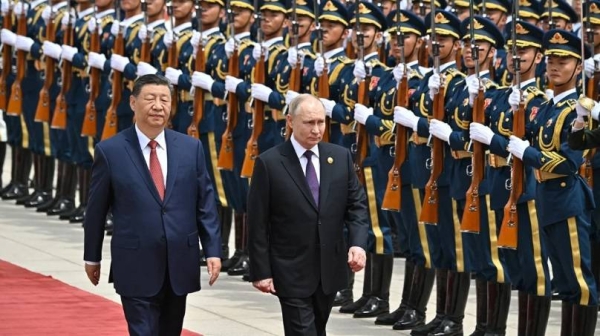
The messages are scrawled on the toilet walls and across stall doors, on the tiles and next to the holders for paper. In Chinese characters, with the occasional English phrase, they echo the words of the protest banner that was unfurled across a busy overpass in Beijing: “No to confinement, we want freedom! No to lies, we want dignity! No to the great leader, we want to vote!”
The stunning act of defiance at the bridge took place on the eve of the 20th Communist party congress, when Xi Jinping officially embarked on a custom-breaking third term as China’s supreme leader, surrounded by a politburo stacked with his loyalists. The party’s narrative of confidence and triumph was nevertheless punctured by one man’s disobedience.
Like the rumblings of thunder that follow a flash of lightning, the daring proclamation has reverberated across the country, despite the bridge protester’s forced disappearance. Public restrooms, one of the last physical spaces in China beyond the government’s watch, have emerged as an unexpected venue for dissent. Replicas of the original banner have been spotted in London across Westminster Bridge and outside the Chinese embassy. Overseas Chinese students have also put up posters in solidarity on telephone poles and university noticeboards.
I click through the images from campuses across North America and Europe. I try to picture the anonymous young faces behind the handwritten notes and hastily designed placards, and catch glimpses of myself from a decade ago. I was one of these students, making sense of a new country while for ever tied to the old home, sizing up newly gained freedoms and wondering how to best exercise them.
When I left China for graduate school in the US in 2009, it still seemed possible to navigate the world with a map of conventional wisdom. My birth country has now become so unrecognisable that I sometimes wonder if the past was a figment of my imagination. With the benefit of hindsight, one can clearly see the trajectory of Beijing’s authoritarian ascent, as the tightening of control began before Xi’s reign. Now, the speculation about how long the red emperor might rule carries the same whiff of denial as the old talk of “Xi the reformer” when he first took office, and the recurring fantasies of a palace coup. The obsession with an individual tyrant overlooks the system that enables that tyranny.
In Xi’s latest address at the party congress, there was no mention of “political reform”, a key phrase that had appeared in all previous reports since the early 1980s. The significance of this shift is not so much that the party has changed, but that it no longer needs the pretence – just like the all-male, 24-member politburo that was unveiled last week, breaking another decades-old convention where one or two women held token seats (though never on the standing committee).
From the very beginning, gestures to “democracy” and “reform” were in service to the Chinese leadership. After the disasters of the Mao era, the party needed new legal and institutional scaffolding to reclaim legitimacy, and to facilitate the transition from a planned economy to integration with the capitalist market. Before Xi consolidated power, competing factions at the top and opaqueness within the bureaucracy meant there was limited flexibility to question and experiment. Individuals and civil society groups manoeuvred this fragile space in order to push for social progress.
Yet the party has never relented on the issues that are central to its power, or hesitated to use force against perceived challenges. A periodic loosening of controls is wielded as an effective tool to gather information and maintain control. With the end of performative deference to legal rules and institutional norms, a party that governs by fear and patronage will embolden the worst instincts of the bureaucracy, where loyalty is rewarded over competence, power is rarely held accountable, and mistakes in policy become exceedingly difficult to correct.
The future is grim, not just for China and its people. Many in the west who have been drumming up a “new cold war” with China take every instance of Beijing’s abuses as proof of a “China threat” and justification for expanding the national security state. The new cold warriors are not so different from their counterparts a generation ago, who preached that marketisation and free trade would usher in political liberalisation. Both narratives stem from an unabashed belief in the supremacy of their own system: the “end of history”. Shifting blame to a faceless foreign other is a convenient diversion from raging crises at home.
The primary struggle in the world today is not the essentialist framing of China versus the US, east versus west. Nor is it the reductionist idea of democracy versus autocracy, freedom versus captivity. The rights and liberties taken for granted in the ostensibly democratic west have been subsidised by cheap labour and imports from authoritarian countries. The free flow of capital demands that toiling bodies be kept in place.
The fundamental choice is between clinging to an old order crumbling under its own weight, and forging a new world while there’s still time. We’re all exiles from a past we thought we knew, stranded on an ice cap amid warming seas. We can fight each other for the receding higher ground, or build lifeboats together: alternative futures of mutual care in which value is not conditional on exclusion or domination.
I cannot recall when I entered a state of perpetual mourning. I grieve for the country I left with no certain prospect of return, the direction it’s heading in, the plight of the world, the foreclosed possibilities. Sorrow tears into my organs and gnaws at my bones. But what I fear more than pain is numbness: to give in to the powers that be, and give up on imagining otherwise.
I remind myself that for a Chinese woman, learning how to read and moving to a foreign country were once revolutionary acts conceived in fugitive spaces. No control is absolute. Power at its most menacing and totalising is also insecure and unsustainable. I hold no illusions about the long night ahead, but each refusal of injustice preserves an opening. Every act of rebellion, however spectacular or humble, is a reclamation of the self and a love letter to a stranger. Across the darkness, another searching gaze catches the flicker, and a sacred bond is cast: I see you. I feel you. We are still here.
Yangyang Cheng is a research scholar at Yale Law School and a particle physicist












